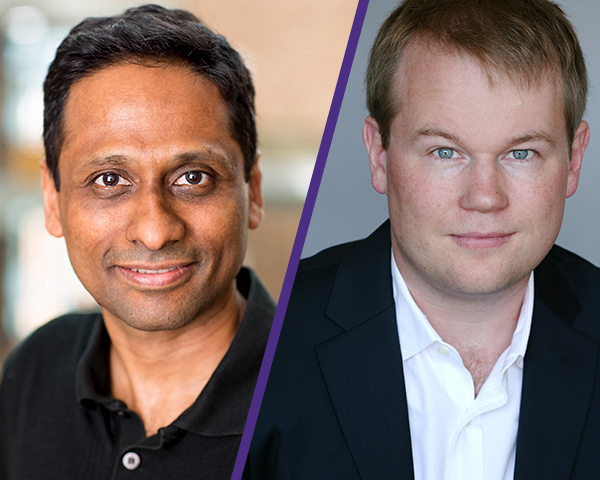
Data centers account for about 2% of total electricity use in the U.S., according to the U.S. Office of Energy Efficiency and Renewable Energy, consuming 10 to 50 times the energy per floor space of a typical commercial office building. Meanwhile, advances in distributed computing have spurred innovation with the use of large, intensive applications — but at a high cost in terms of energy consumption and environmental impact.
A pair of Allen School professors will contribute to a multi-university effort focused on tackling these challenges in the distributed computing landscape. Arvind Krishnamurthy and Michael Taylor will lend their expertise to the ACE Center for Evolvable Computing, which will foster the development of computing technologies that improve the performance of microelectronics and semiconductors.
Funded by a $31.5 million grant from the Joint University Microelectronics Program 2.0 (JUMP 2.0), the ACE Center will advance distributed computing technology — from cloud-based datacenters to edge nodes — and further innovation in the semiconductor industry. Led by the University of Illinois Urbana Champaign and with additional funds from partnering institutions, the ACE Center will have a total budget of $39.6 million over five years.
“Computation is becoming increasingly planet-scale, which means not only that energy efficiency is becoming more and more critical for environmental reasons, but that we need to rethink how computation is done so that we can efficiently orchestrate computations spread across many chips distributed around the planet,” Taylor said. “This center is organizing some of the best and brightest minds across the fields of computer architecture, distributed systems and hardware design so that we may come up with innovative solutions.”
Krishnamurthy, the Short-Dooley Professor in the Allen School, is an investigator on the “Distributed Evolvable Memory and Storage” theme. His research focuses on building effective and robust computer systems, both in terms of data centers and Internet-scale systems. The ACE Center is not the only forward-looking initiative that is benefiting from Krishnamurthy’s expertise; he is also co-director of the Center for the Future of Cloud Infrastructure (FOCI) at the Allen School, which was announced last year.
“We are seeing an explosion of innovations in computer architecture, with a continuous stream of innovations in accelerators, programmable networks and storage,” Krishnamurthy said. “One key goal of this center is how to make effective use of this hardware and how to organize them in large distributed systems necessary to support demanding applications such as machine learning and data processing.”
Taylor, who leads the Bespoke Silicon Group at the Allen School, is an investigator in the “Heterogeneous Computing Platforms” theme. He’ll act as a fulcrum for research directions and guide a talented team of graduate students in designing distributed energy-efficient accelerator chips that can better adapt with ever-changing and more complicated computing environments.
“Today’s accelerator chips are very fixed function, and rapidly become obsolete, for example, if a new video encoding standard is developed,” Taylor said. “With some fresh approaches to the problem, accelerators in older cell phones would still be able to decode the newer video standards.”
Taylor has previously worked with the Defense Advanced Research Projects Agency (DARPA), which oversees JUMP, and the Semiconductor Research Corporation (SRC), helping organize a pair of 5-year research centers, including the Applications Driving Architectures (ADA) center and the Center for Future Architecture Research (C-FAR) center. The NSF Career Award winner joined the Allen School and UW Department of Electrical & Computer Engineering in 2017.
Both Krishnamurthy and Taylor will contribute to the ACE Center’s goal to create an ecosystem that fosters direct engagement and collaborative research projects with industry partners drawn from SRC member companies as well as companies in the broader areas of microelectronics and distributed systems.
In addition to Taylor and Krishnamurthy at the University of Washington, other contributors to the ACE Center include faculty from the University of Illinois, Harvard, Cornell, Georgia Tech, MIT, Ohio State, Purdue, Stanford, the University of California San Diego, the University of Kansas, the University of Michigan and the University of Texas at Austin.

